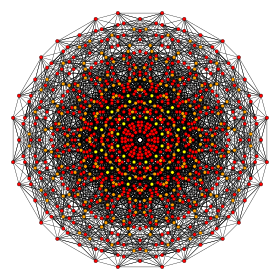| Truncated 7-demicube Cantic 7-cube | |
|---|---|
 D7 Coxeter plane projection | |
| Type | uniform 7-polytope |
| Schläfli symbol | t{3,34,1} h2{4,3,3,3,3,3} |
| Coxeter diagram | |
| 6-faces | 142 |
| 5-faces | 1428 |
| 4-faces | 5656 |
| Cells | 11760 |
| Faces | 13440 |
| Edges | 7392 |
| Vertices | 1344 |
| Vertex figure | ( )v{ }x{3,3,3} |
| Coxeter groups | D7, [34,1,1] |
| Properties | convex |
In seven-dimensional geometry, a cantic 7-cube or truncated 7-demicube as a uniform 7-polytope, being a truncation of the 7-demicube.
A uniform 7-polytope is vertex-transitive and constructed from uniform 6-polytope facets, and can be represented a coxeter diagram with ringed nodes representing active mirrors. A demihypercube is an alternation of a hypercube.
Its 3-dimensional analogue would be a truncated tetrahedron (truncated 3-demicube), and Coxeter diagram ![]()
![]()
![]() or
or ![]()
![]()
![]()
![]()
![]() as a cantic cube.
as a cantic cube.